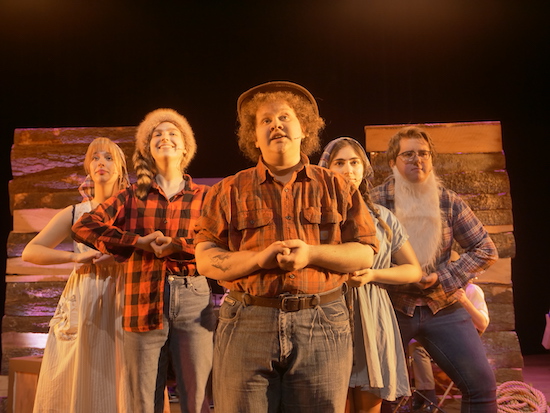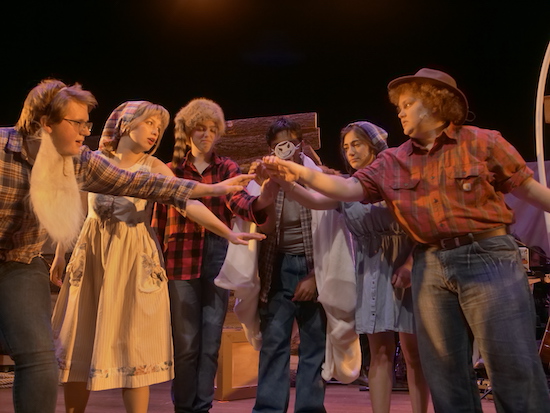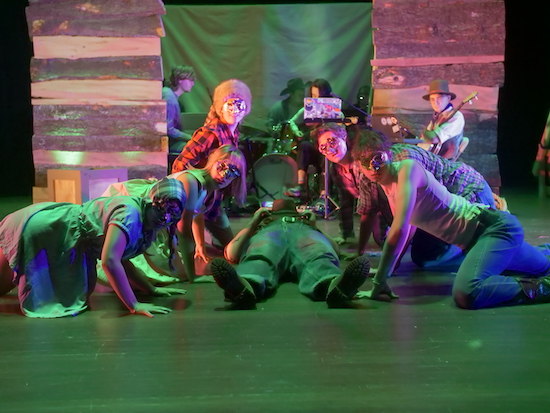
When we get to this point in the semester, Wesleyan students need nothing more than a good laugh to distract them from increasing workloads and impending finals. Thankfully, on Nov. 15 and 16, Spike Tape gave us the musical comedy “The Trail to Oregon” in the Patricelli ’92 Theater, taking full advantage of the medium of live theater to deliver a unforgettably hilarious experience.
“The Trail to Oregon,” created by StarKid Productions and directed by Hannah Sodickson ’26 and Nat Wheeler ’25, is a musical parody of the video game series, “The Oregon Trail,” a text-based computer program that debuted in 1971 to educate players about the hardships experienced by pioneers in the 1800s traveling West in pursuit of the American Dream. No prior knowledge of the game is required or expected from anyone seeing the show, as it is just the setting for the journey of the show’s hilarious characters.
The show introduces us to its family of protagonists with a song led by the father (Adam Mohn ’26), his wife (Liv Daigneault ’27), daughter (Sasha Nelson ’28), son (Cassidy Kalke ’28), and father-in-law, called “Grandpa” (Zeke Allman ’27). The father instructs the audience to name each family member one by one, an element of the show that brought many laughs from the crowd. At the staging I attended on Friday, names such as “Waluigi” got even more laughter when they were called out in otherwise serious scenes, or when an actor would forget someone’s name and force their co-star to break character to remind them. For continuity’s sake, I’ll continue to call the characters by their familial roles, but it’s moments like these that make “The Trail to Oregon” such a unique experience that you have to see for yourself to truly understand.
The directors explained the importance of improvised moments like these and how they enhance the show’s experience.
“We knew when we chose this show that there were a lot of interactive elements, which was something that was very exciting for us,” Sodickson wrote in an email to The Argus. “We made sure the actors leaned into these moments, and we allowed them the freedom to improvise during the show.”
Where an actor breaking character might ruin the experience of watching another show, the interactive nature of “The Trail to Oregon” allowed for these moments of communion between performer and audience.
“We would tell the actors to try and remember their names, but if they didn’t, we knew it would branch off into even more potential laughs,” Wheeler wrote. “There’s a big sense of accomplishment in directing a show where the actors break character, and yet none of it takes the audience out of the show.”
After the introduction, Daughter is approached by a stranger named McDoon (Kate Lyman ’26), who flirts with her and warns her about the notorious Bandit King and his sidekick, Cletus Jones (Allman). Meanwhile, the manager of the neighborhood general store (Zesun Hossain ’28) sells the family a wagon loaded with bullets, along with an ox (Hossain) that looks like it’s seen better days. After Cletus yells out his name and identifies McDoon as the Bandit King, the mother quickly scares the two away, with McDoon promising vengeance on the family and swearing that Daughter will be his “child wife.”

Seemingly fully prepared, the family sets off on their journey, only to notice that their wagon may be faulty. When their wagon breaks down, Son, Daughter, and Grandpa are sent with a rifle to hunt for food because Son ate all their grass reserves. After Daughter misses a shot and scares an animal off, Grandpa gives the gun to Son and tells him about his “War of 1812” against an army of lobsters, claiming to have rid the land of all lobsters and cast them out to sea, with the only loss being the only million dollar bill in the world (with his face on it), which was stolen by the lobsters in retaliation.
The trio then finds a family of buffalo, but Son has moral qualms about killing them. To convince him to pull the trigger, Grandpa sings “Pays to Be an Animal,” which leaves us with more questions than answers. Nevertheless, it does the trick. Son shoots the buffalo family at point-blank range. The three hunters then take all the meat they can carry and head back to the wagon.
After a fight between Mother and Daughter that culminates with Mother faking her own death and resurrection, Daughter loudly wishes that she didn’t have a family and that McDoon would find them and take her away. This hurts her mother, who has a moment of clarity in song during “When the World’s at Stake,” a personal favorite of both directors.
“Being one of the few serious moments in the entire show, it has a lot riding on it, and it delivers everything you could hope for,” Wheeler wrote in an email to the Argus.
Later, after Father makes several attempts to convince his wife to “lie with him,” she finally agrees, only to be bitten by a venomous snake the moment she climbs into bed. Father sucks the venom out, but just when we think the problem is fully solved, he swallows the venom which sends him into a coma.
While the whole family thinks he is dead and prepares a funeral with what was supposed to be Grandpa’s coffin and a headstone marked “Peperony and Chease,” Father has a psychedelic trip where a disembodied voice makes him aware of the audience’s presence, telling him that the “watchers” will kill a member of his family, which we all essentially did when we were asked to vote on which character would be killed off upon entering the theater.
Father wakes from his hallucination and tells the family about what just happened to him but is cut short by the return of McDoon and Cletus Jones, who end the first act by setting the family’s wagon on fire and kidnapping Daughter.
We return to see Daughter alone in McDoon’s wagon, already desperately missing her family. The rest of the group, heartbroken and defeated, arrives at a pub to take a rest. Mother pays for her drink with her wedding ring, giving false hope to the bartender (Hossain) and destroying Father. Mother then takes her son and continues forward on the trail, leaving Father and Grandpa at the bar.
Grandpa takes this time to give Father a pep talk, confessing that he was once a member of the lobster world, but had to leave after the love of his life was stolen by his best friend, Cornwallis. He urges Father to not make the same mistakes that he did and go after his wife, when suddenly the general store manager enters the bar. Father, resolving to do whatever it takes to get his family back, demands a refund for the faulty wagon he bought and, when that doesn’t work, he holds him and his girlfriend (Nelson) at gunpoint and robs him of his wagon. Father and Grandpa set off to find their family, reuniting with Mother and Son and speeding off to find Daughter.
Meanwhile at the Bandit King’s wagon, Cleetus Jones expresses his jealousy of Daughter, envious of the attention she has been getting from McDoon. Daughter tells Cleetus that if he wants McDoon so bad he should set her free, but Cleetus rejects this offer since it is against McDoon’s wishes. McDoon returns and the trio sets off, but they hit a roadblock when they come across the Columbia River. McDoon and Cleetus decide that the best course of action is to float their wagon across the river, but they hit a rock that sends them flying off the wagon and into the river. Daughter grabs onto a rock, and although she tries saving the bandits, McDoon’s ego sends the pair flying down the river, never to be seen again. Daughter desperately wishes for her family to return, which comes true almost instantly when the wagon party finds her in the river. Despite the imminent danger, the family enters the river and manages to reach her, but crash and wreck their wagon. Grandpa wakes to see that he and his family were rescued by none other than Cornwallis the Lobster (Hossain), a plot twist that was my favorite moment of the show.
“The moment that got the best reaction [during all three performances] was the appearance of Cornwallis, the Leader of the Lobsters,” Wheeler wrote. “The subplot of ‘Grandpa telling crazy stories of how he fought actual lobsters during the War of 1812’ is such a…bizarre running gag [that is] continuously…brought to the audience’s attention. After two hours, when the entire story is proven…true and the leader of the lobsters (Cornwallis) actually appears on stage, it’s the most perfect and cathartic payoff anyone could have asked for.”

After Grandpa and Cornwallis share a moment, the lobster disappears, and the rest of the family wakes up and notices that they are just a few steps away from Oregon’s border. Before they can cross the state line, however, they are approached by a doctor (Lyman) who tells them that before they can enter Oregon, they must pass an inspection for dysentery. All but one family member passes—the family member that got the most votes from the “watchers” before the show started. The chosen family member then sings “You Gotta Go” to everyone while slowly dying to a chorus of fart sounds made by the doctor into a microphone. The song is a double entendre, with the lyrics being easily interpreted as being about both moving forward in the face of adversity and really having to use the bathroom.
After the victim bites the dust, the rest of the family drags their body across the border so they can fulfill their promise of making it to Oregon as a family, and miraculously, the fresh, clean air of Oregon resuscitates the dead person, and Grandpa discovers that Cornwallis returned his million dollar bill to him. To celebrate, Son convinces the family to go skinny-dipping with him in the lake, and the whole cast comes out to join him as the curtains close on “The Trail to Oregon.”
“The Trail to Oregon” was an experience that was entertaining and hilarious through and through. Everything from the live band to the interactive elements to the plot twists made me hate having to take notes for this article because it meant I had to take my eyes off the stage and risk missing something, which goes to show how much of a ride this show truly was. Having watched the original production on YouTube after the fact, I can confidently say that Spike Tape perfectly captured the magic of this show that StarKid gave us in 2014.
“Our overall goal for this process was to create joy every step of the way, whether it was in the rehearsal room with the actors or on stage in front of the audience,” Sodickson wrote.
Amidst the stress of the semester’s final weeks, the wholesome humor of the show was just what the doctor ordered and just what the directors intended.
“If anything, I just hope that people got to have a fun time watching an absurd musical that makes absolutely no sense from a logical point of view, instead opting for a ridiculously stupid story that goes all over the place,” Wheeler wrote. “We wanted this production to exude nothing but pure joy and excitement, and I know we achieved that with every show!”
Elijah Willner can be reached at ewillner@wesleyan.edu.


Leave a Reply